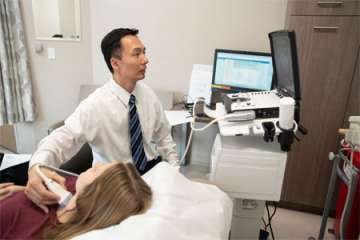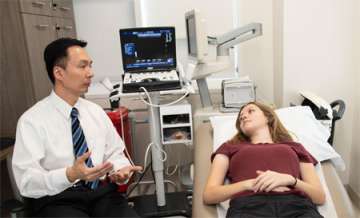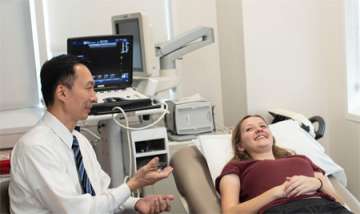UCLA Pediatric Thyroid Program
Find your care
We deliver effective, minimally invasive treatments in a caring environment. Call 310-267-7838 to connect with an expert in endocrine surgery.
Thyroid nodules and thyroid cancer cancer in children
An interview with Dr. Harvey Chiu, Chief of the UCLA Pediatric Thyroid Cancer Program

Why did you decide to become a pediatric endocrinologist?
I love endocrinology because it is rewarding to see patients respond quickly to hormone treatments you implement. Hormones have a drastic effect on our bodies, and patients frequently respond instantaneously. It provides a lot of personal satisfaction to see patients get better because of what you do.
I completed a dual residency in both adult and pediatric endocrinology, which took around 6 years. I chose to specialize in pediatric endocrinology because kids are a joy to work with. While adults respond quickly to treatment, kids respond that much faster. It is incredibly rewarding to see kids improve, because they have so many years ahead of them.
What is unique about the approach UCLA Pediatric Thyroid Program takes to treating thyroid disorders? How are advances in technology/research impacting patient care?
UCLA Pediatric Thyroid Program is integrated with the UCLA Endocrine Center, which is a multidisciplinary integrated practice. We are fortunate to have access to unparalleled resources and a high level of subspecialty expertise that allow us to provide outstanding care for children.
- For example, if we have a child with a thyroid nodule, we are able to perform ultrasound-guided biopsies and have the tissue analyzed by on-site pathology right at that visit. Additionally, we utilize cutting edge technology, such as needle-less anesthesia to ensure a painless process.
At UCLA, we uniquely have radiology services immediately on-site. This not only increases convenience for the patient, but it also enables physicians to discuss their findings with the radiologist directly.
- Through combining the physician’s clinical insights and radiologist’s findings in real-time, we are able to develop the best assessment of a child’s condition.
- This allows for a level of communication that is unmatched by a printed report.
UCLA makes an effort to cater to the needs of children and has the accompanying experience and technology to deliver excellent outcomes.
- A good example of this in my practice is the needle-less anesthesia technique, which I have implemented and perfected through years of fine-tuning and practice.
- The first thing children frequently ask when they’re told they need a procedure is, “is there a needle?” When you can demonstrate that there is no needle involved, that relieves a lot of fear for the kids and the parents.
Thyroid nodules in children
How are thyroid nodules treated differently in children vs. adults, and why is this important?

We diagnose nodules through a procedure called the FNA biopsy, which tells us about whether the nodule is benign or cancerous. At UCLA, we utilize different thresholds for performing biopsies in children versus in adults. This is because a nodule of the same dimensions will be proportionally larger in kids, due to their smaller body size. Our biopsy threshold for children is 5-10mm, whereas in adults we traditionally biopsy nodules over 10mm.
- It is important to recognize the physiological differences between children and adults, because otherwise certain details may be overlooked.
Through investigating nodules of a smaller size, we may be able to detect signs of thyroid cancer during its earlier stages. It is beneficial to diagnose earlier, especially considering that children have many more decades of longevity.
Are there any common misconceptions about thyroid nodules in children?
Yes. Thyroid cancer in children very frequently spreads to nearby lymph nodes in the neck. Despite this, survival rates for childhood thyroid cancer are excellent with appropriate treatment. This is confusing for some people. But the bottom line is that kids usually do really well long term even when the lymph nodes are involved. We do have to be careful in terms of ensuring complete surgery and performing proper follow up care in order to achieve these results.
What is the normal course of treatment for thyroid nodules?
On the first visit, we start with a history, physical examination, and often an ultrasound. If we find a nodule that is suspicious on ultrasound, we may perform an ultrasound-guided biopsy in the clinic. Depending on the results, we may either choose to monitor the nodule closely or choose to surgically remove it.
Thyroid cancer in children
How is thyroid cancer different in children versus adults?
In patients with thyroid nodules, the risk of an underlying thyroid cancer is 5% for adults. However, that risk is 20% in children. So we do need to be more cautious when we evaluate thyroid nodules in children and take this problem seriously.
What is the role of radioactive iodine in the treatment of children with thyroid cancer?
Radioactive iodine is given as a follow-up treatment to some patients with thyroid cancer. This is done after surgery. UCLA is one of the few centers in LA that provides radioactive iodine therapy to children.
What else makes the UCLA Pediatric Thyroid Cancer program special?
At UCLA, we bring together on-site pathology technicians and physicians to analyze tissue and discuss in real-time. This allows us to better diagnose patients and reduce the need for a repeat biopsy.
What important messages do you have for the parents of children who are diagnosed with thyroid cancer?

Fortunately, thyroid cancer is a very slow progressing cancer, with excellent long-term survival rates (90% for papillary thyroid cancer, which is the most common type of thyroid cancer).
I would advise patients to choose an experienced physician and surgeon, because this is paramount to achieving good long-term outcomes.
At UCLA, we have surgeons who are experienced in their work. They perform endocrine operations full time. We hope to deliver optimal outcomes through bringing together expertise that is predicated by experience and of course our personal commitment to each patient we meet.
How does a diagnosis of thyroid cancer impact the course of an individual’s life?
Patients are still able to lead productive lives following thyroid cancer. They will require long-term thyroid hormone replacement medication and careful monitoring to keep the cancer at bay. For some children, the cancer goes away completely, some live with it, and a subset may require further treatments.
Our goal at the UCLA Pediatric Thyroid Program is to allow children to grow up to live happy, productive lives.